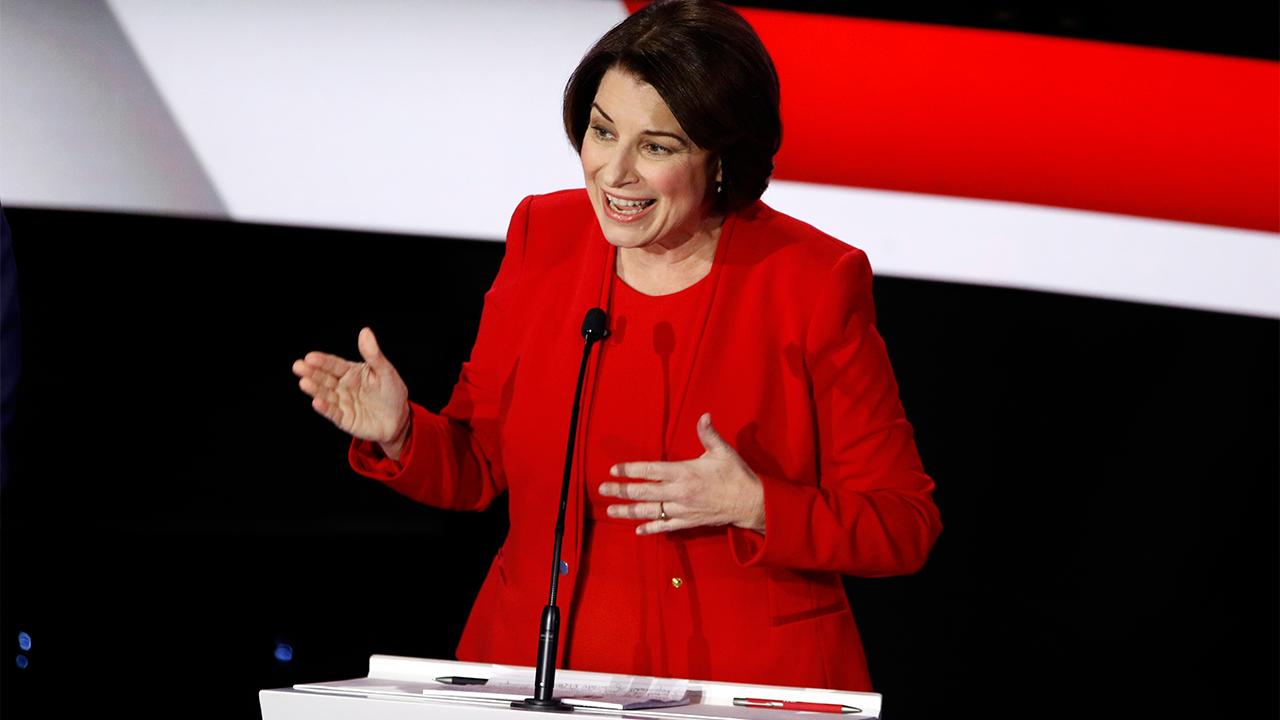As Klobuchar surges in New Hampshire, a look at her economic policies
Klobuchar has billed herself as a moderate pragmatic willing, and able, to work across the political aisle
New Hampshire’s first-in-the-nation primary included a surprising twist that has the potential to shake up the shape of the Democratic primary: A late-surging Amy Klobuchar landed in third place, ahead of Sen. Elizabeth Warren and Joe Biden.
"Hello, America! I'm Amy Klobuchar and I will beat Donald Trump," she told a cheering crowd on Tuesday night. "My heart is full tonight. While there are still ballots to count, we have beaten the odds every step of the way."
The Minnesota senator trailed only Sen. Bernie Sanders, who won, and former South Bend, Indiana, Mayor Pete Buttigieg, boosted by her strong debate performance last week.
The strong showing for Klobuchar, who’s billed herself as a moderate pragmatic willing, and able, to work across the political aisle, has the potential to power her campaign ahead of Nevada’s caucuses on Feb. 22. Klobuchar is polling in the low single digits in both Nevada and South Carolina, according to an average from RealClearPolitics.
Here’s where the Minnesota senator stands on major economic issues:
Health care: That’s evident in her call for a more “practical” health care reform agenda: She’s said she favors universal health care, with an eventual transition to a plan similar to Medicare-for-all.
“I am just simply concerned about kicking half of America off their health insurance in four years, which is exactly what this bill says,” she said during the first Democratic presidential debate.
SANDERS, BUTTIGIEG ARE WINNING THE 2020 CAMPAIGN FUNDRAISING RACE
But unlike her progressive rivals, she favors getting there via a public option that expands Medicare or Medicaid. She’s previously supported Hawaii Rep. Brian Schatz’s plan, which would allow states to create a public insurance option through Medicaid for all Americans. It gives people with incomes over 400 percent of the poverty level, who are ineligible for premium subsidies, an option to buy into Medicaid. Premiums would be capped at 9.5 percent of the family income. It’s unclear what this plan costs.
Klobuchar, whose father struggled with alcoholism, has also unveiled a $100 billion plan to combat drug and alcohol addiction and improve mental health care. It would expand access to treatment and launch new prevention and early intervention initiatives.
On top of that, she proposed allowing people to order prescription drugs from places like Canada, where the costs are lower, as well as lifting the ban on negotiations for cheaper drugs under Medicare Part D. She’s also introduced legislation that would allow the federal government to block anti-competitive “pay to delay” settlements, which allow brand-name drug producers to pay generic-drug producers to delay the market of their more affordable products. There’s wide bipartisan support in Congress for many of these policies.
BLOOMBERG TO CAPITALIZE ON IOWA CAUCUS FIASCO BY DOUBLING AD SPENDING
Spending on prescription drugs per person in the U.S., adjusted for inflation, has surged from $90 in 1960 to $1,025 in 2017.
Taxes: Klobuchar has proposed increasing taxes on capital gains and dividends for individuals in the two highest income brackets. People who earn more than $1 million would be required to pay at least a 30 percent minimum tax rate. She’s also recommended applying the 12.4 percent Social Security payroll tax on wages higher than $250,000. Finally, she favors expanding the earned-income tax credit to benefit more families.
Another proposal from Klobuchar includes raising the corporate tax rate to 25 percent from the current 21 percent and closing loopholes that encourage U.S. companies to operate overseas. The 2017 Tax Cuts and Jobs Act slashed the corporate tax rate from 35 percent -- which is where a number of Democrats want to return it.
Like a number of her rivals for the Democratic nomination, Klobuchar supports raising the federal minimum wage to $15 per hour.
Minimum wage: The federal minimum wage rate has at $7.25 per hour for the past decade. In July, the Democratic-controlled House voted to pass legislation that would raise it to $15 by 2025; however, the Republican-controlled Senate would not consider the bill, essentially ending the years-long effort to raise wages for millions of workers.
Student loans: Klobuchar is against the sweeping student loan forgiveness plans backed by some of her competitors. Instead, she has proposed allowing current student loan borrowers to refinance their existing loans at lower rates close to 3 percent.
Although she has fought against making college tuition-free (or debt-free), she’s suggested that community colleges should be free.




















